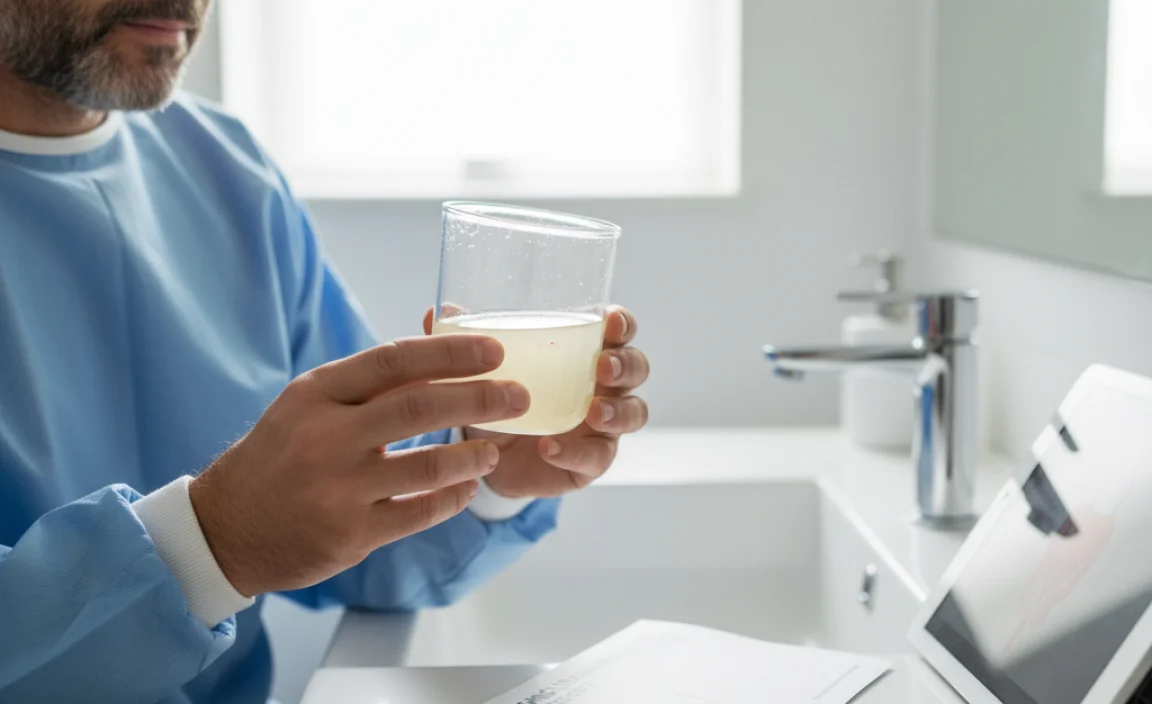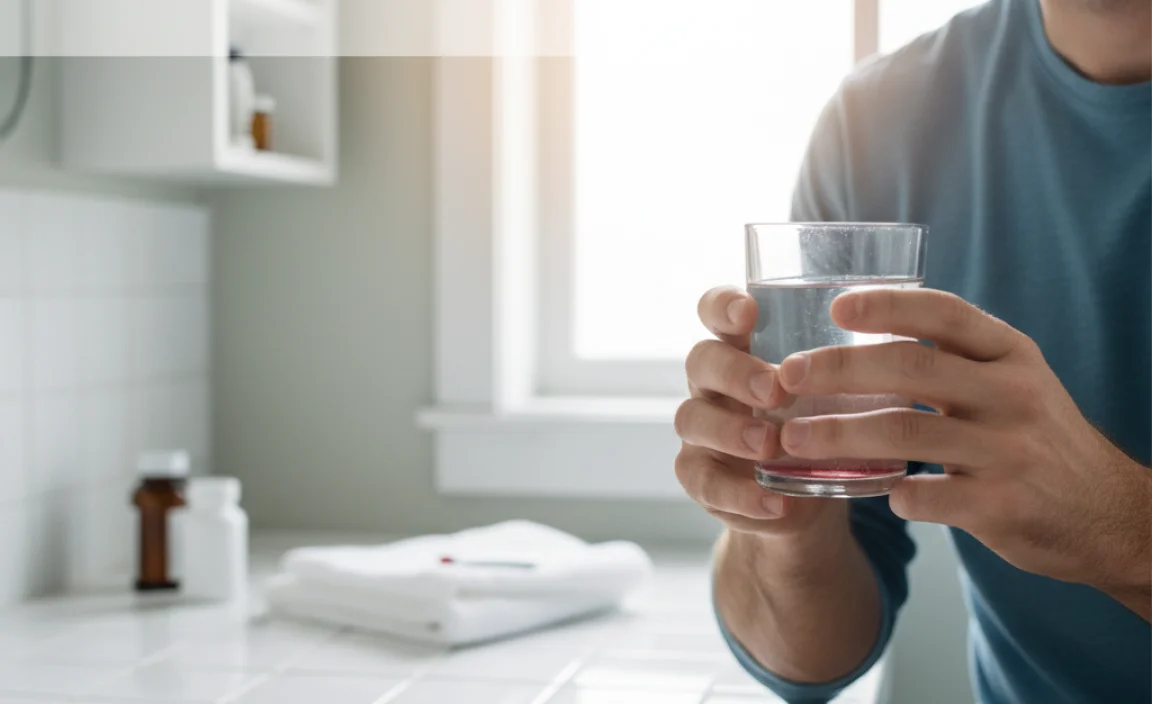Quick Summary: Seeing a little blood in your urine after bladder surgery is often normal, especially in the first few days. It’s usually due to the healing process. Stay hydrated by drinking plenty of fluids, monitor the color of your urine, and follow your doctor’s instructions carefully. Contact your doctor if the bleeding increases, you pass clots, or experience pain or fever.
Finding blood in your urine after bladder surgery can be alarming. It’s natural to feel worried! But often, a little blood is a normal part of recovery. Your body is healing, and some bleeding is expected. The key is to know what’s normal and when to seek help. We’ll walk you through what to expect, how to monitor your recovery, and when to call your doctor. Let’s make this recovery as smooth as possible!
Understanding Hematuria After Bladder Surgery

Hematuria, or blood in the urine, is a common occurrence after bladder surgery. Several factors contribute to this, and understanding them can ease your concerns.
Why Does It Happen?
During bladder surgery, the surgeon may need to cut or manipulate tissues within the bladder and urinary tract. This can cause small blood vessels to break, leading to blood in the urine. Here are some common reasons:
- Surgical Trauma: The physical act of surgery can cause bleeding.
- Catheter Insertion: A catheter, often used after surgery to drain urine, can irritate the bladder and urethra.
- Healing Process: As the surgical site heals, minor bleeding can occur.
How Long Is It Normal?
Typically, you might see blood in your urine for a few days to a couple of weeks after surgery. The amount of blood usually decreases over time. Here’s a general timeline:
- First Few Days: Expect the most noticeable blood.
- First Week: The bleeding should start to decrease.
- Second Week: You might still see some blood, but it should be minimal.
If the bleeding persists or worsens after two weeks, it’s important to contact your doctor.
Monitoring Your Urine

Keeping a close eye on your urine is crucial for tracking your recovery. Here’s how to do it effectively.
What to Look For
Pay attention to the color and consistency of your urine. Here’s what different colors might indicate:
- Bright Red: This usually indicates fresh blood.
- Dark Red or Brown: This suggests older blood.
- Pink: This indicates a small amount of blood.
Also, check for blood clots. Small clots are usually not a major concern, but large or numerous clots should be reported to your doctor.
Keeping a Record
It can be helpful to keep a simple record of your urine’s appearance. Here’s a sample table you can adapt:
| Date | Time | Color | Clots? (Yes/No) | Other Notes |
|---|---|---|---|---|
| [Date] | [Time] | [Color] | [Yes/No] | [Any additional observations] |
| [Date] | [Time] | [Color] | [Yes/No] | [Any additional observations] |
| [Date] | [Time] | [Color] | [Yes/No] | [Any additional observations] |
Steps to Take at Home

There are several things you can do at home to manage hematuria and promote healing.
Stay Hydrated
Drinking plenty of fluids helps to flush the bladder and urinary tract, reducing the concentration of blood. Aim for at least eight glasses of water a day, unless your doctor advises otherwise. Water is best, but you can also include herbal teas and clear broths.
Avoid Irritants
Certain foods and drinks can irritate the bladder, potentially worsening hematuria. It’s best to avoid these:
- Caffeine: Coffee, tea, and energy drinks
- Alcohol: Beer, wine, and spirits
- Spicy Foods: Hot peppers and sauces
- Acidic Foods: Citrus fruits and tomatoes
Rest and Avoid Strenuous Activity
Rest is crucial for healing. Avoid heavy lifting, strenuous exercise, and any activities that put pressure on your abdomen. Light walking is usually fine, but check with your doctor.
Follow Medication Instructions
Take all medications as prescribed by your doctor. If you’re taking blood thinners, be especially vigilant about monitoring your urine, as these can increase bleeding. Never stop taking medication without consulting your doctor first.
When to Contact Your Doctor

While some blood in the urine is normal after bladder surgery, certain signs warrant immediate medical attention.
Signs of Concern
Contact your doctor right away if you experience any of the following:
- Increased Bleeding: If the amount of blood in your urine increases significantly.
- Large Blood Clots: Passing large or numerous blood clots.
- Pain: Severe pain in your abdomen, back, or during urination.
- Fever: A fever of 100.4°F (38°C) or higher.
- Difficulty Urinating: Trouble passing urine or a complete inability to urinate.
- Signs of Infection: Chills, body aches, or cloudy urine.
Preparing for the Call
When you call your doctor, be prepared to provide detailed information about your symptoms. This will help them assess your situation and provide appropriate advice. Here’s what to include:
- Description of Urine: Color, presence of clots, and any changes you’ve noticed.
- Pain Level: Describe the location and intensity of any pain.
- Medications: List all medications you’re currently taking.
- Recent Activities: Mention any activities that might have aggravated your condition.
Preventing Complications

Taking proactive steps can help prevent complications and promote a smoother recovery.
Preventing Infection
Infection is a significant concern after any surgery. Here are some tips to minimize your risk:
- Hygiene: Practice good hygiene, especially when using the bathroom.
- Catheter Care: If you have a catheter, follow your doctor’s instructions for cleaning and care.
- Stay Hydrated: Drinking plenty of fluids helps flush out bacteria.
- Avoid Irritants: Steer clear of bladder irritants like caffeine and alcohol.
Managing Constipation
Constipation can put extra strain on your abdomen, potentially increasing bleeding. Here’s how to manage it:
- Fiber: Eat plenty of fiber-rich foods like fruits, vegetables, and whole grains.
- Hydration: Drink plenty of water to keep things moving.
- Gentle Exercise: Light walking can help stimulate bowel movements.
- Stool Softeners: If necessary, use a stool softener as recommended by your doctor.
Proper Wound Care
If you have any surgical incisions, follow your doctor’s instructions for wound care. Keep the area clean and dry, and watch for signs of infection like redness, swelling, or drainage.
Dietary Considerations
What you eat can significantly impact your recovery. Focus on foods that support healing and avoid those that might irritate your bladder.
Foods to Include
Incorporate these foods into your diet to promote healing:
- Fruits and Vegetables: Rich in vitamins and antioxidants.
- Lean Protein: Helps with tissue repair.
- Whole Grains: Provides fiber for digestive health.
- Water: Essential for hydration and flushing out toxins.
Foods to Avoid
Steer clear of these foods and drinks that can irritate the bladder:
- Caffeine: Coffee, tea, and energy drinks.
- Alcohol: Beer, wine, and spirits.
- Spicy Foods: Hot peppers and sauces.
- Acidic Foods: Citrus fruits and tomatoes.
- Artificial Sweeteners: Can irritate the bladder in some people.
The Role of Catheters
Catheters are often used after bladder surgery to help drain urine. Understanding their role and proper care is essential.
Why Are They Used?
Catheters help to ensure that your bladder remains empty while it heals. They also prevent urine from accumulating, which can reduce the risk of infection and other complications.
Types of Catheters
There are two main types of catheters:
- Indwelling Catheters: These are inserted into the bladder and remain in place for a period of time.
- Intermittent Catheters: These are inserted and removed several times a day to drain urine.
Catheter Care
Proper catheter care is crucial to prevent infection and other complications. Here are some tips:
- Hygiene: Wash your hands thoroughly before and after handling the catheter.
- Cleaning: Clean the area around the catheter insertion site daily with soap and water.
- Emptying: Empty the catheter bag regularly to prevent it from becoming too full.
- Securement: Secure the catheter to your leg to prevent it from pulling or dislodging.
Alternative Therapies
Some alternative therapies may help to promote healing and reduce inflammation after bladder surgery. Always consult with your doctor before trying any new therapies.
Herbal Remedies
Certain herbs are believed to have anti-inflammatory and healing properties. Some examples include:
- Turmeric: Contains curcumin, which has anti-inflammatory effects.
- Ginger: Can help reduce inflammation and nausea.
- Cranberry: May help prevent urinary tract infections.
Be sure to discuss any herbal remedies with your doctor, as they can interact with medications.
Acupuncture
Acupuncture is a traditional Chinese medicine technique that involves inserting thin needles into specific points on the body. Some people find it helpful for managing pain and promoting healing.
Mind-Body Techniques
Techniques like meditation, yoga, and deep breathing can help reduce stress and promote relaxation, which can aid in the healing process.
Long-Term Recovery
The long-term recovery process after bladder surgery involves gradually returning to your normal activities and monitoring for any potential complications.
Gradual Return to Activity
Don’t rush back into your regular routine. Gradually increase your activity level over time, and listen to your body. If you experience pain or discomfort, slow down.
Follow-Up Appointments
Attend all follow-up appointments with your doctor. These appointments are crucial for monitoring your progress and detecting any potential problems early.
Potential Long-Term Issues
Be aware of potential long-term issues that can arise after bladder surgery, such as:
- Urinary Incontinence: Difficulty controlling urination.
- Urinary Frequency: Needing to urinate more often than usual.
- Erectile Dysfunction: Difficulty achieving or maintaining an erection.
If you experience any of these issues, talk to your doctor. There are often treatments available to help manage these conditions.
Resources and Support
Recovering from bladder surgery can be challenging, but you’re not alone. There are many resources and support systems available to help you.
Online Communities
Online forums and support groups can provide a valuable source of information and emotional support. You can connect with other people who have gone through similar experiences and share tips and advice. Check out the Bladder Cancer Advocacy Network (BCAN) at https://www.bcan.org/.
Support Groups
Local support groups can offer in-person connections and a sense of community. Ask your doctor or hospital about support groups in your area.
Professional Counseling
If you’re struggling with anxiety, depression, or other emotional issues related to your surgery, consider seeking professional counseling. A therapist can provide you with tools and strategies to cope with these challenges.
Conclusion
Seeing a little blood in your urine after bladder surgery can be unsettling, but remember that it’s often a normal part of the healing process. By staying informed, monitoring your urine, and following your doctor’s instructions, you can manage your recovery effectively. Stay hydrated, avoid bladder irritants, and get plenty of rest. Know the signs that warrant medical attention, and don’t hesitate to reach out to your healthcare team if you have any concerns. With the right care and attention, you’ll be back on your feet in no time!
Frequently Asked Questions (FAQ)
Here are some frequently asked questions about blood in the urine after bladder surgery.
Is it normal to see blood clots in my urine after surgery?
Small blood clots are fairly common. However, if you’re passing large or numerous clots, contact your doctor right away.
How much water should I drink each day after surgery?
Aim for at least eight glasses of water daily, unless your doctor tells you otherwise. Staying hydrated helps flush your urinary system.
What foods should I avoid to prevent bladder irritation?
Avoid caffeine, alcohol, spicy foods, and acidic foods like citrus fruits and tomatoes, as these can irritate your bladder.
When should I worry about a fever after surgery?
A fever of 100.4°F (38°C) or higher is a sign of potential infection. Contact your doctor immediately.
Can I take over-the-counter pain relievers?
Check with your doctor before taking any over-the-counter pain relievers, especially NSAIDs like ibuprofen, as they can increase bleeding risk. Acetaminophen (Tylenol) is often a safer choice, but always confirm with your healthcare provider.
How long will I need to use a catheter?
The duration of catheter use varies. Your doctor will determine when it’s safe to remove it based on your healing progress.
What if I have difficulty urinating after the catheter is removed?
Difficulty urinating should be reported to your doctor. It could indicate swelling or other issues that need attention.
